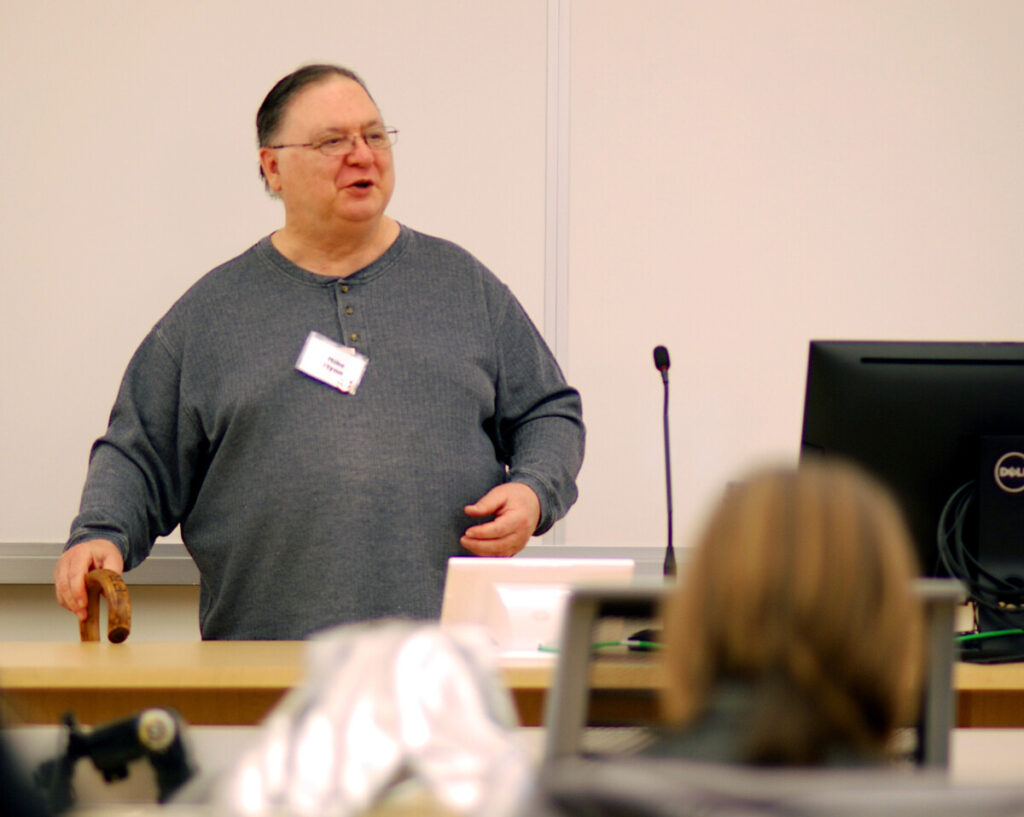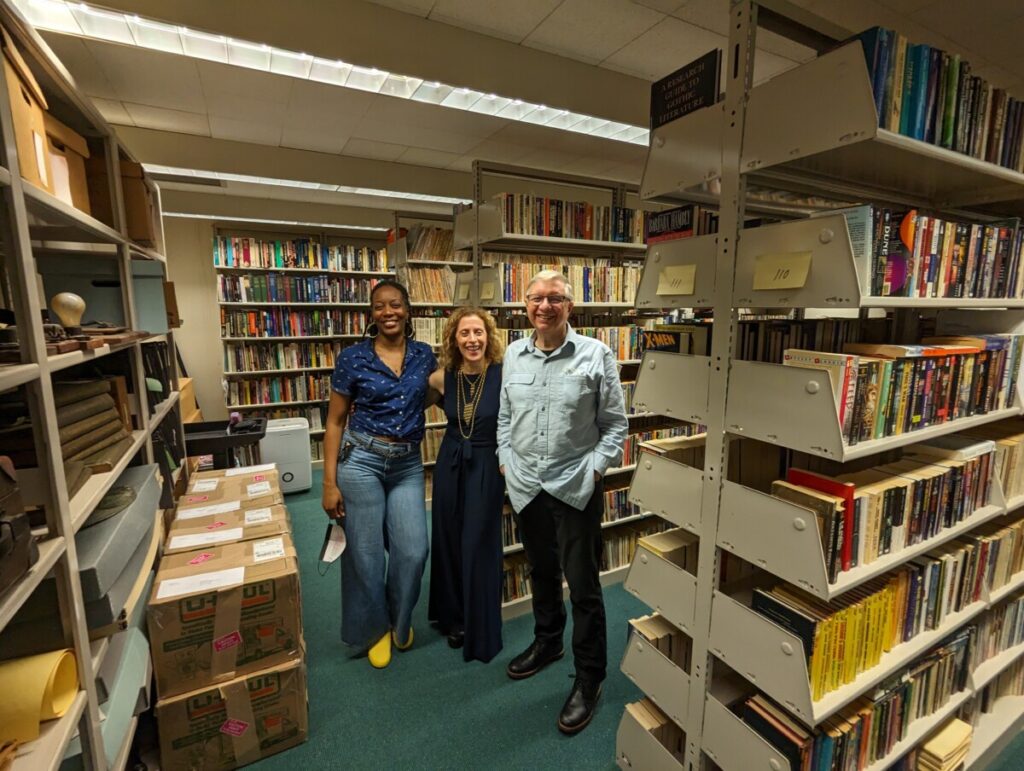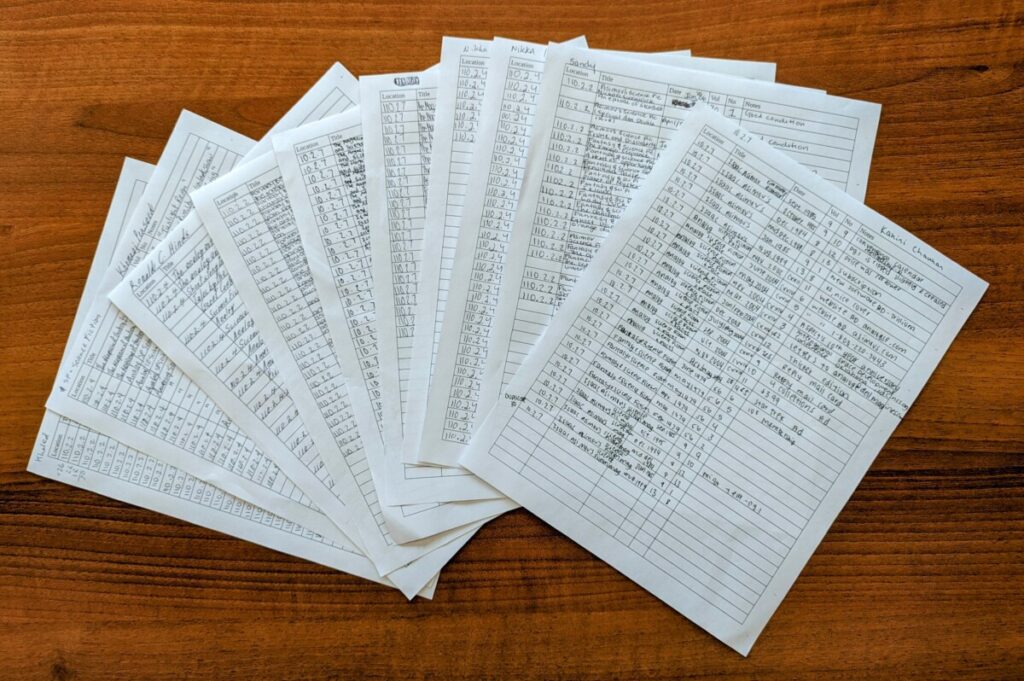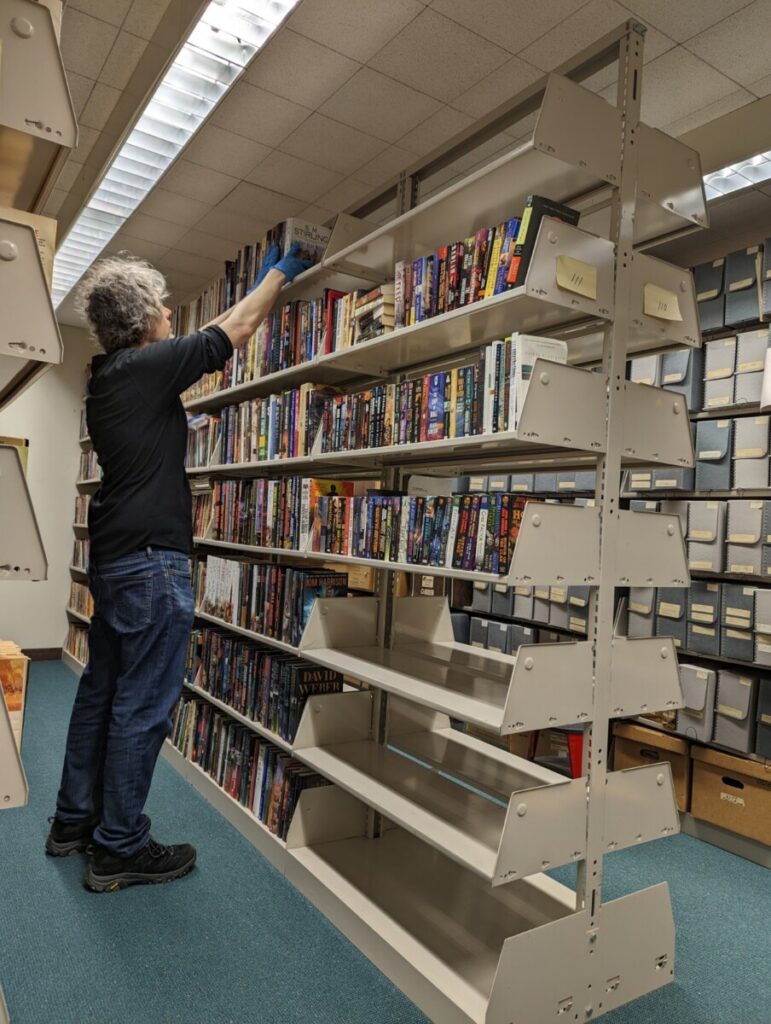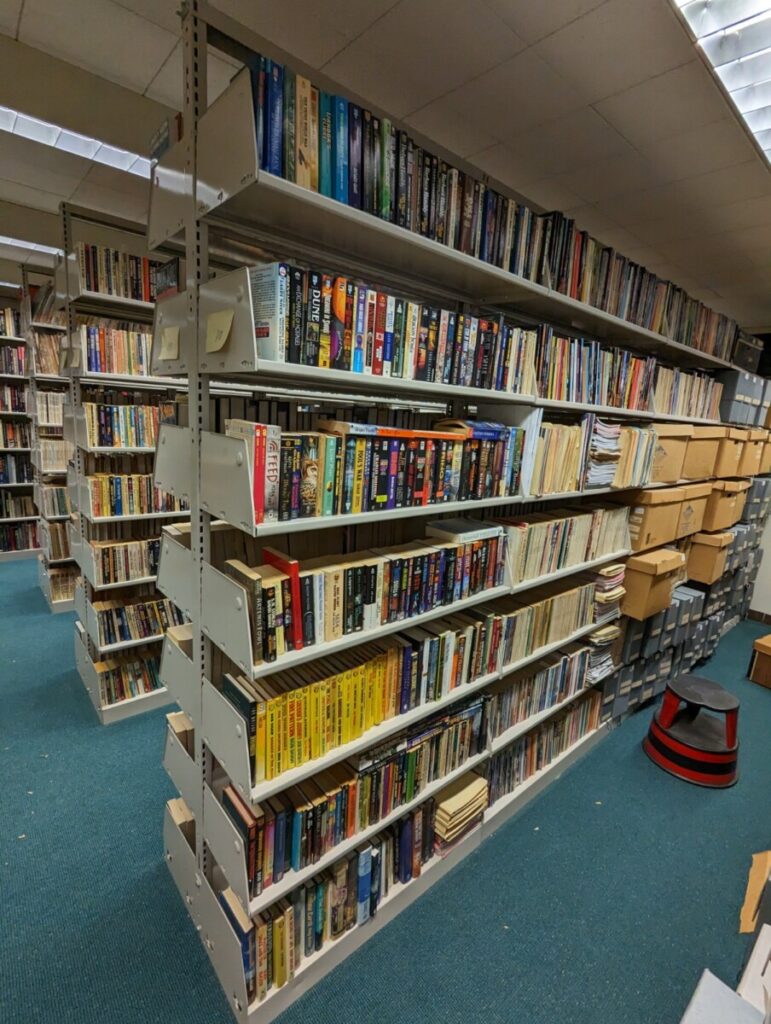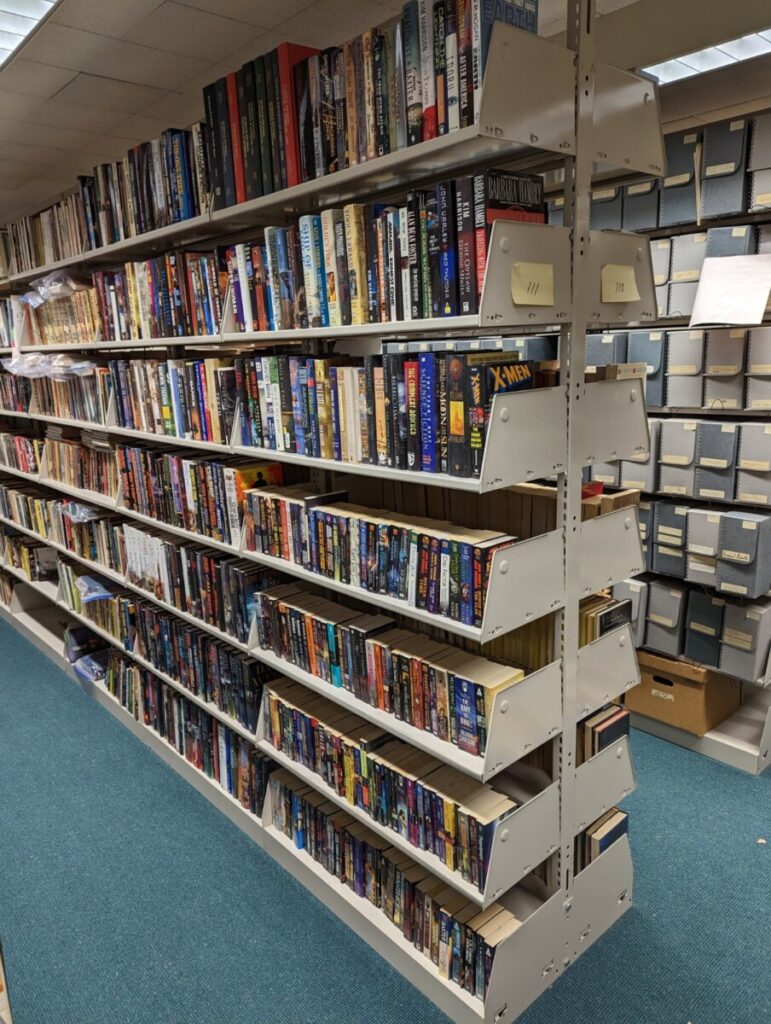I learned from Emily Hockaday today that Mike Flynn, the renowned science fiction writer and keynote speaker for the Fourth Annual City Tech Science Fiction Symposium, has passed away. We were honored to have him join us and share his stories at that year’s symposium celebrating 90 years of Astounding/Analog Science Fiction and Fact. Locus Magazine has an obituary here, and his family’s announcement on Facebook is here.
Author Archives: Jason W. Ellis
City Tech Foundation and Brooklyn Waterfront Research Center Members Visit the Collection
On June 14, 2023, City Tech Foundation Executive Director Beth Farryn Levine and Brooklyn Waterfront Research Center Director and English Professor Richard Hanley visited the City Tech Science Fiction Collection while Jason Ellis and Wanett Clyde were moving eight new boxes of donated material from Charlie Seelig into the Archives and Special Collections.
Information Architecture Students Work in the Collection
On Monday, May 8, Prof. Jason Ellis brought his ENG3790 Information Architecture students in the Professional and Technical Writing Program to the City Tech Science Fiction Collection to learn about how IA principles were employed to quickly make it accessible using DIY strategies. Also, the students gathered metadata from recently donated and shelved material for the collection’s finding aid. Many thanks to the students who were able to contribute to this invaluable City Tech research and teaching resource: Khaled Akam, Tiana Beatty, Kahini Chauhan, Jaida Clouden, Sphear Forde, Sandy Fougeres, Ronald Hinds, Khemraj Persaud, and Nikka Rosenstein.
Pandemic Donations Shelved in the Archives
In the previous post, we finally were able to relocate all of the materials donated to the City Tech Science Fiction Collection during the pandemic into the Library’s Archives space. On Thursday, April 20, 2023, Prof. Jason Ellis was able to shelve the material thanks to the efforts of Prof. Wanett Clyde and the librarian staff to open 30 shelves for the additional material.
The first step involved cleaning each shelf of accumulated dust and letting it dry before shelving any material.
Then, each box was opened in turn and its contents shelved in the stacks. The primary objective was to get the materials out of the boxes and onto the shelves, because some of the boxes had been damaged during shipping and the materials were exposed and/or smashed together. With limited time and uncertainty about how much material there was of each type, a strategy was adopted to put like materials together: hard cover fiction, paperback fiction, and periodicals/fanzines/ephemera. Later, a photographic inventory will be made of each shelf and each item will be entered into the finding aid.
Thank you again to Charlie Seelig, Analog Science Fiction and Fact, City Tech Professor Lucas Bernard and his father Kenneth Bernard, the experimental playwright and English professor whose materials were donated, and Emeritus Professor of English at Texas A&M University-Corpus Christi and former president of the Science Fiction Research Association David Mead!
Pandemic Donations Moving Day
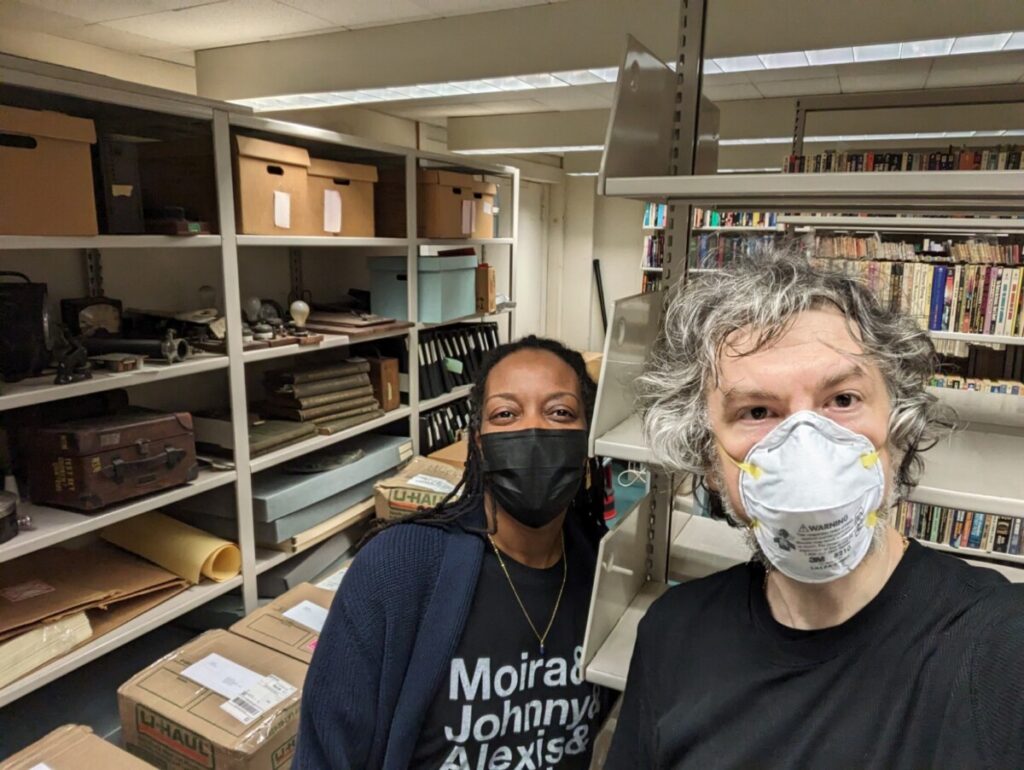
On Tuesday, Feb. 28, 2023, Professor and Collections Management Librarian Wanett Clyde and English Department Professor Jason Ellis moved donated materials acquired during the first phase of the pandemic into the City Tech Science Fiction Collection’s space in the Archives and Special Collections of the Ursula C. Schwerin Library.
During the pandemic, we received a lot of new material for the City Tech Science Fiction Collection, including magazines, novels, collections, academic journals, and monographs. These materials were donated by Charlie Seelig (~20 boxes of EVERYTHING), Analog Science Fiction and Fact (~4 boxes of magazines from their old office space), City Tech Professor Lucas Bernard (2 boxes of material that belonged to his father Kenneth Bernard, the experimental playwright and English professor), and Emeritus Professor of English at Texas A&M University-Corpus Christi and former president of the Science Fiction Research Association David Mead (1 box of Jack Vance materials), The Special Collections and Archives in the City Tech Library unfortunately were unable to open enough shelf space for these materials, so Wanett and Jason stored everything in their offices–with most of it being in Jason’s office (see below).
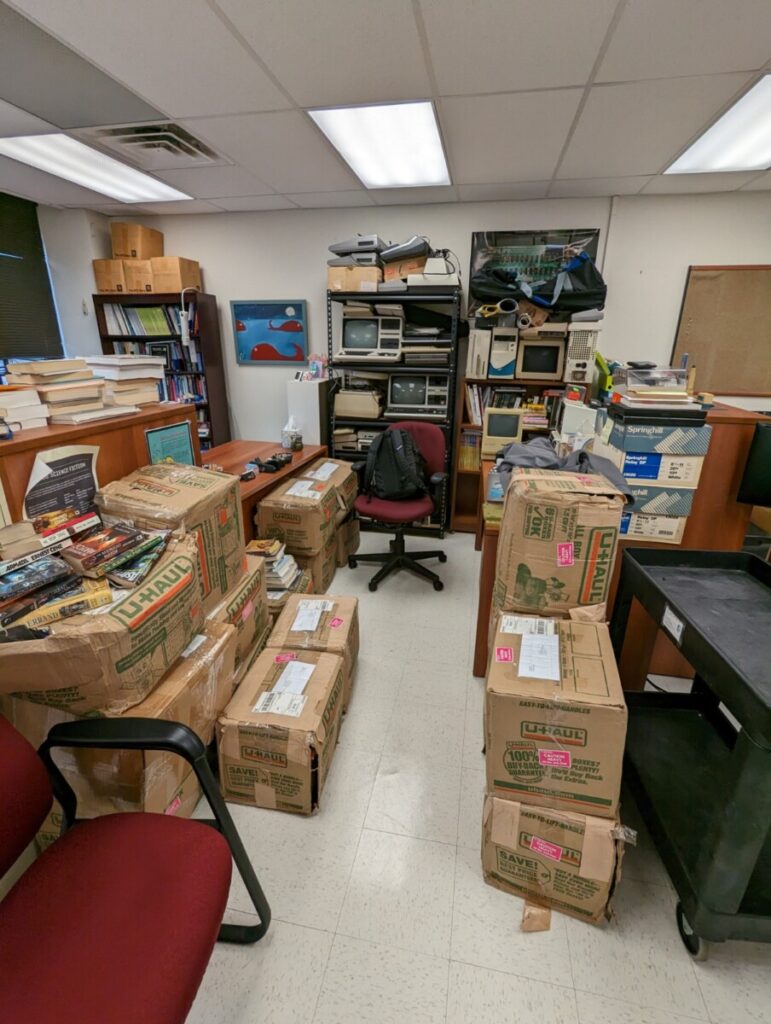
This semester, however, Wanett was able to work with library staff to open up additional shelf space in the archives for the donated materials (in the photo below, the background stacks are the City Tech Science Fiction Collection).
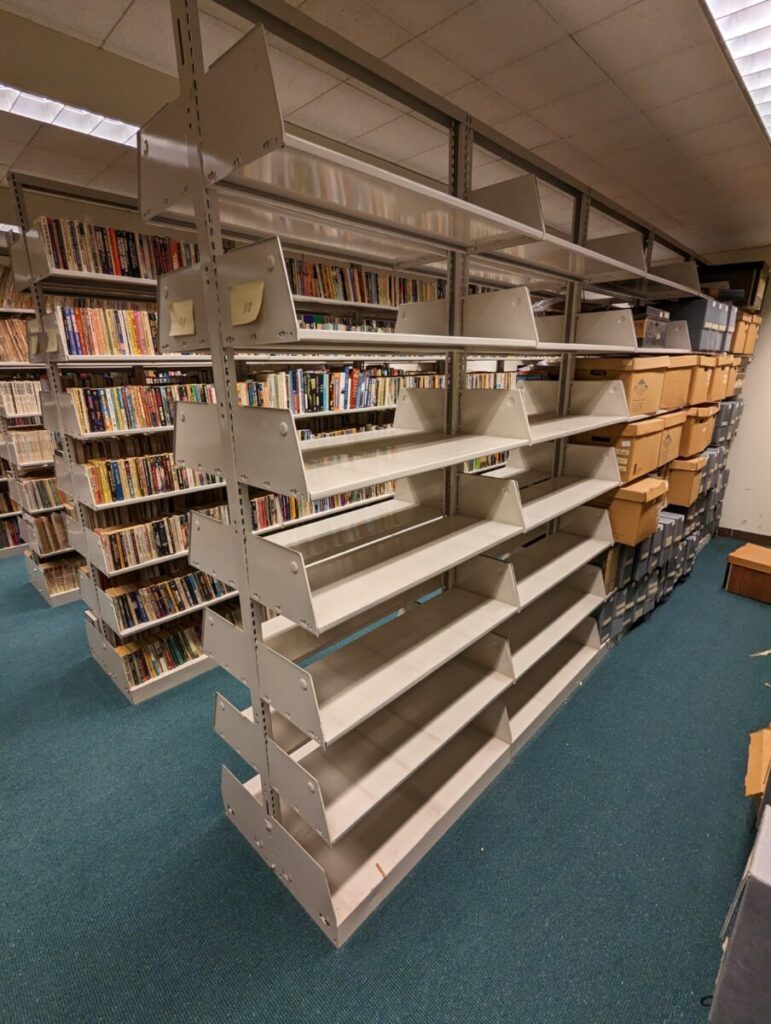
On Tuesday, Feb. 28, 2023, Jason coordinated with Wanett to begin moving the materials one cart load at a time into the archives.
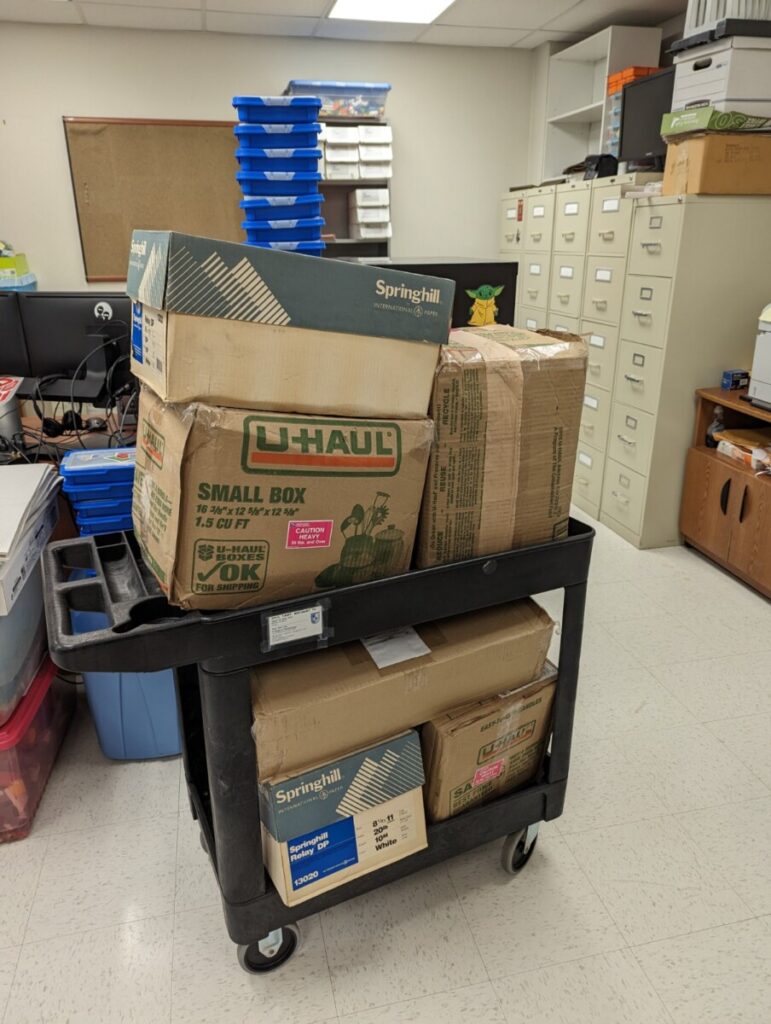
It took about two-and-a-half-hours to move 22 boxes of material into the archives. The first few cart loads were successful–an elevator ride from the fifth floor of Namm to the fourth floor, and then walk to the fourth floor of the Library Building to take the service elevator up to the fifth floor of the Library Building and a short walk to the archives room. Unfortunately, the service elevator died before the last load was delivered, so Jason toted those 40 pound boxes one at a time on the last leg of the journey. Now, all of the material has been relocated to the archives room.
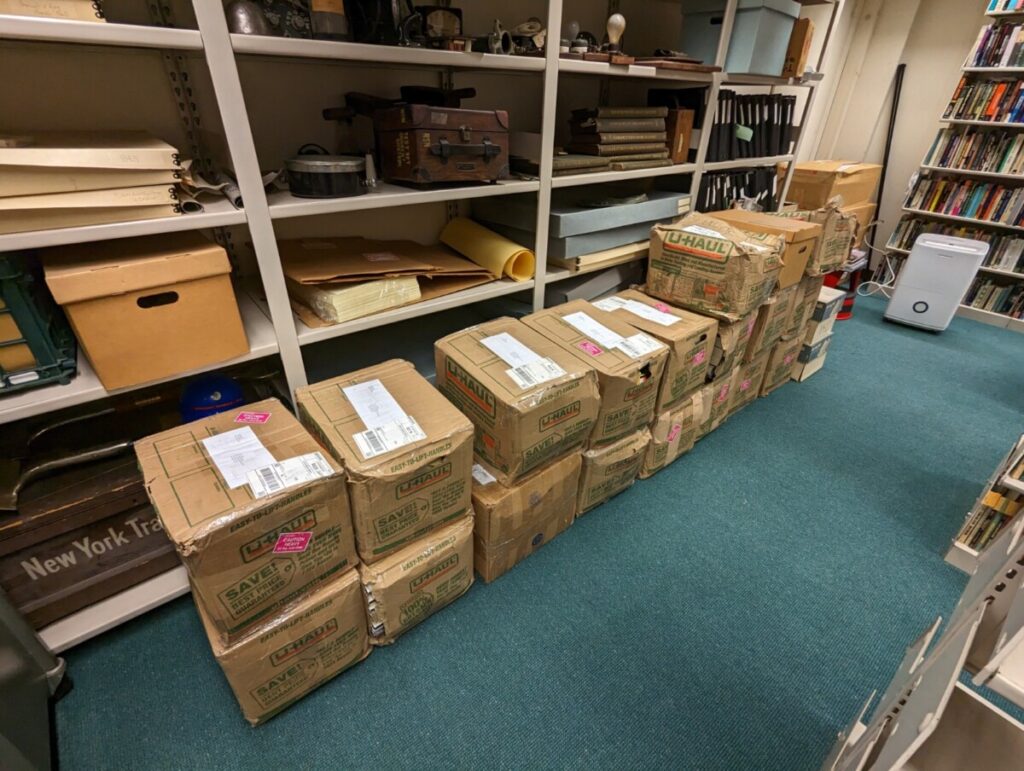
The next phase of integrating the materials will involve unboxing and shelving like materials on the available shelf space, which will be followed by a photographic inventory of each shelf and inventorying the items into the finding aid, which as we know from past experience, will take the most time and energy. However, Jason has plans to bring his Professional and Technical Writing students in his Spring 2023 Information Architecture class to the archives to perform some of the inventorying work as part of a discussion of database construction, categorization, and metadata.
Videos from the Seventh Annual City Tech Science Fiction Symposium on the Archive and SF
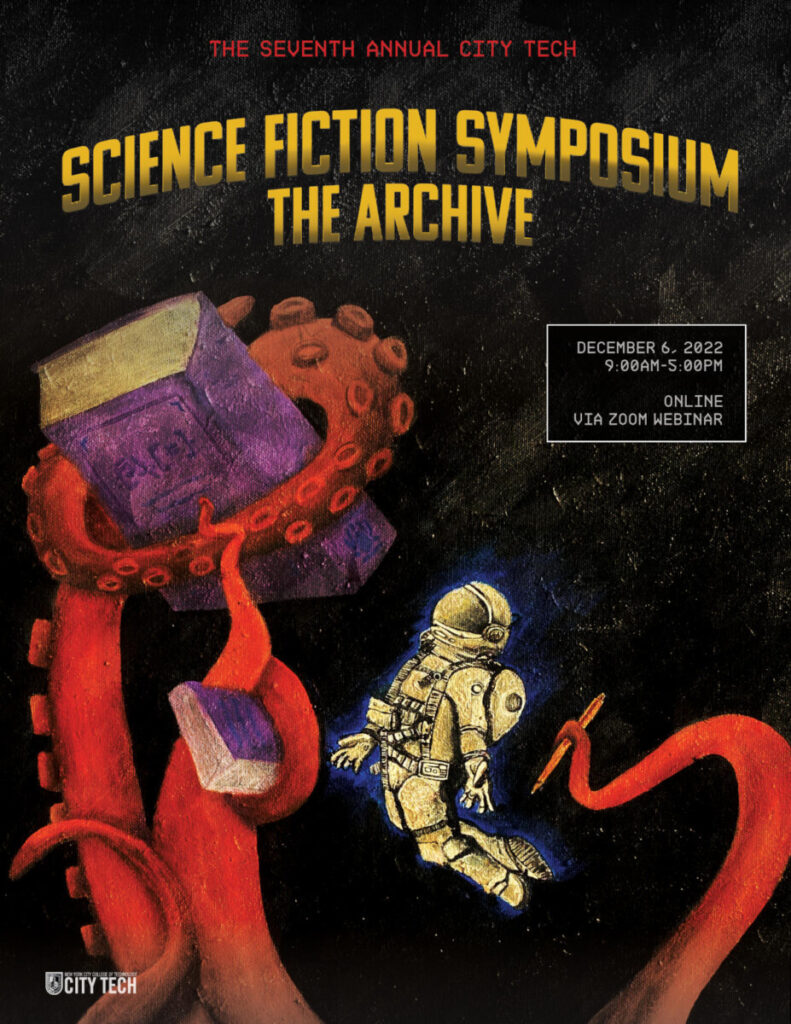
The Seventh Annual City Tech Science Fiction Symposium on the Archive and SF was held on Tuesday, Dec. 6, 2022 as a Zoom Webinar. You can read the full program here.
Included below are videos of each session.
Many thanks again to everyone who participated and contributed to this year’s event!
Opening
Jason W. Ellis
Justin Vazquez-Poritz
Paper Session 1: Archival Research
Jill Belli – Moderator
Jessica Aaron – “Preventing Planetary Patriarchy: Subversions of the White Man’s Ideal World in Early SF Pulps”
Chris Leslie – “The Republic of (Interstellar) Letters: From the Archives of Asimov and Merril”
Gillian Polack – “Story as Archive: How Speculative Fiction Novels Both Preserve and Interpret Cultural Material”
Panel Discussion: A Tale of Two Archives
Jason Ellis (City Tech)
Matthew Frizzell (Georgia Tech)
Kel Karpinski (City Tech)
Alison Reynolds (Georgia Tech)
Lisa Yaszek (Georgia Tech)
Panel Discussion: Georgia Tech’s Sci Fi Lab: Archival Research, Octavia’s Ancestor’s Project, and Radio Play
Lisa Yaszek – Moderator
Panelists:
Val Barnhart
Laurence Copeland
Killian Vetter
Edeliz Zuleta
Analog Writers Panel and the Analog Emerging Black Voices Award
Emily Hockaday – Moderator
Kedrick Brown
Meghan Hyland
Kelsey Hutton
Douglas Dluzen
Trevor Quachri and Emily Hockaday – Award Presentation
Paper Session 2: Archives in SF
Lucas Kwong – Moderator
Jacob Adler – “Summit of Knowledge: Archiving the Fantastical”
Rhonda Knight – “A Data Thief in the Archive: Reading Sofia Samatar’s ‘An Account of the Land of Witches’”
Adam McLain – “‘Only an Echo’: The Memory of the Archive and the Archive of Memory in Lois Lowry’s The Giver“
Kenrick H. Kamiya Yoshida and Ida Yoshinaga – “An Okinawan Speculative Arts Archive”
Paper Session 3: Latinx SF in the Archive
Leigh Gold – Moderator
Matthew David Goodwin – “The Latinx Multiverse and the Fictional Recovery of Latinx Science Fiction”
Dolores González Ortega and Valeria Seminario – “Inside the Latin American Science Fiction Archive: Challenges and Contributions to a Growing Academic Field”
Keynote
Jeremy Brett – “Making Space: Science Fiction Archives and the Archival Citizen”
Jason Ellis – Introduction and Moderator
Program and Registration for the 7th Annual City Tech Science Fiction Symposium on the Archive and SF

Registration and Viewing
The Seventh Annual City Tech Science Fiction Symposium on the Archive and Science Fiction will be held on Tuesday, December 6, 2022 from 9:00am-5:00pm EST (GMT/UTC -5 hours) online via Zoom Webinar.
To participate in this free event, attendees will need to do these two things: (1) Signup for a free Zoom account here (if you don’t already have one), and (2) Register here to receive access instructions to the Zoom Webinar. Participants may register any time before or during the event!
For those who would like to watch the event without registering, you can join the YouTube Livestream here (click on the top-most video labeled “Live” or go directly to the Livestream here).
In addition to the Zoom Webinar Chat and YouTube Live Chat, join the event conversation with the event hashtag #CityTechSF and #SFArchive and follow us on Twitter @CityTechSF.
As indicated below in the program, some symposium content is pre-recorded to offer more time for discussion on the day of the event. Pre-recorded content includes author readings and full paper presentations. Some of this content is in production and will be posted soon.
Program
9:00am-9:15am
Opening
Jason W. Ellis
Justin Vazquez-Poritz
9:15am-10:05am
Paper Session 1: Archival Research
Jill Belli – Moderator
Jessica Aaron – “Preventing Planetary Patriarchy: Subversions of the White Man’s Ideal World in Early SF Pulps”
Chris Leslie – “The Republic of (Interstellar) Letters: From the Archives of Asimov and Merril”
Gillian Polack – “Story as Archive: How Speculative Fiction Novels Both Preserve and Interpret Cultural Material”
10:05am-10:10am
Break
10:10am-11:00am
Panel Discussion: A Tale of Two Archives
Jason Ellis (City Tech)
Matthew Frizzell (Georgia Tech)
Kel Karpinski (City Tech)
Alison Reynolds (Georgia Tech)
Lisa Yaszek (Georgia Tech)
11:00am-11:05am
Break
11:05am-11:55am
Panel Discussion: Georgia Tech’s Sci Fi Lab: Archival Research, Octavia’s Ancestor’s Project, and Radio Play
Lisa Yaszek – Moderator
Panelists:
Val Barnhart
Laurence Copeland
Killian Vetter
Edeliz Zuleta
11:55am-12:00pm
Break
12:00pm-1:55pm
Analog Writers Panel and the Analog Emerging Black Voices Award
Emily Hockaday – Moderator
Kedrick Brown
Meghan Hyland
Kelsey Hutton
Douglas Dluzen
Trevor Quachri and Emily Hockaday – Award Presentation
1:55pm-2:00pm
Break
2:00pm-3:20pm
Paper Session 2: Archives in SF
Lucas Kwong – Moderator
Jacob Adler – “Summit of Knowledge: Archiving the Fantastical”
Rhonda Knight – “A Data Thief in the Archive: Reading Sofia Samatar’s ‘An Account of the Land of Witches'”
Adam McLain – “‘Only an Echo’: The Memory of the Archive and the Archive of Memory in Lois Lowry’s The Giver“
Kenrick H. Kamiya Yoshida and Ida Yoshinaga – “An Okinawan Speculative Arts Archive”
3:20pm-3:25pm
Break
3:25pm-4:10pm
Paper Session 3: Latinx SF in the Archive
Leigh Gold – Moderator
Matthew David Goodwin – “The Latinx Multiverse and the Fictional Recovery of Latinx Science Fiction”
Dolores González Ortega and Valeria Seminario – “Inside the Latin American Science Fiction Archive: Challenges and Contributions to a Growing Academic Field”
4:10pm-4:15pm
Break
4:15pm-5:00pm
Keynote
Jeremy Brett – “Making Space: Science Fiction Archives and the Archival Citizen”
Jason Ellis – Introduction and Moderator
Participants
Jacob Adler has worked as the Metadata/Cataloging Librarian at Bronx Community College Library since 2017. Before that he worked in a variety of cataloging positions, including in the library department of The Paley Center for Media in New York from 2010 to 2016. His interests include early television history, game design, and creative writing. He participated in the 2018 National Novel Writing Month, and hopes to turn the resultant work into a published novel in the future. He has also presented at the 2018 CUNY Games Conference, and has given presentations at the City Tech Science Fiction Symposium in 2020 and 2021.
Jessica Aaron is a third-year undergraduate student at the University of Chicago. Her research focuses on the intersection between ethics and science fiction. She received funding to conduct intensive archival research on “Planetary Epistemology in the Science Fiction Pulps” from the University of Chicago’s College Summer Institute and Quad Scholars program.
Val Barnhart is a second year Literature, Media, and Communications student in the Ivan Allen College of Liberal Arts at Georgia Tech. She works on the production team in Dr. Lisa Yaszek’s Sci-Fi Lab. Her inspiration for her work stems from a mix of real-world observations and fake-world TTRPG campaigns.
Jill Belli is Associate Professor of English at New York City College of Technology, CUNY, where she happily teaches science fiction and utopian studies often. She’s working on long-standing projects on well-being & happiness in education and writing & revising in speculative fiction. Newer interests include nature writing, healing & illness, tarot & astrology as storytelling / intuitive literacy, and grief. Learn more about Jill and her interdisciplinary research and teaching: jillbelli.org.
Jeremy Brett is an Associate Librarian at Cushing Memorial Library & Archives, Texas A&M University, where he is both Processing Archivist and the Curator of the Science Fiction & Fantasy Research Collection. He has also worked at the University of Iowa, the University of Wisconsin-Milwaukee, the National Archives and Records Administration-Pacific Region, and the Wisconsin Historical Society. He received his MLS and his MA in History from the University of Maryland – College Park in 1999. His professional interests include science fiction, fan studies, and the intersection of libraries and social justice.
Kedrick Brown, now residing in Cambridge, MA, is a trader and inventor who believes in the power of stories to inspire amazing forms of human cooperation. His first introduction to science fiction was watching episodes of Star Trek in Liberia, which later helped inspire him to major in physics at Rutgers as an undergraduate. Kedrick has been most inspired in his writing by science fiction works that suggest that the universe may be far more wondrous than commonly believed. He also has an MBA from Wharton and is pursuing a Masters in Design Engineering at Harvard.
Laurence Copeland is an undergraduate researcher in the Sci Fi Lab@Georgia Tech.
Douglas Dluzen, PhD, is the Director of the Professional Development and Career Office at Johns Hopkins University. He’s previously been a senior science writer and editor at the NIH and a geneticist studying the genetic contributors to aging, cancer, hypertension, and other age-related diseases. He loves to write science and science fiction while sitting on the couch with his wife Julia (who has immeasurably helped him fact-check and edit his work), son Parker, and daughter Cedar. You can find him on Twitter (for now) at @ripplesintime24!
Jason W. Ellis is an Associate Professor of English at the New York City College of Technology, CUNY, where he coordinates the City Tech Science Fiction Collection and directs the B.S. in Professional and Technical Writing Program. He coedited The Postnational Fantasy: Postcolonialism, Cosmopolitics and Science Fiction (McFarland, 2011) and a special issue on Star Wars: The Force Awakens of New American Notes Online, and talked with Dr. Neil deGrasse Tyson about the relationship between SF and society on StarTalk Radio. He holds a Ph.D. in English from Kent State University, M.A. in Science Fiction Studies from the University of Liverpool, and B.S. in Science, Technology, and Culture from Georgia Tech.
Matt Frizzell is the Assessment Librarian and Subject Specialist for Science Fiction Studies at Georgia Tech. He has a master’s in library and information science from Florida State University and a bachelor’s in anthropology from Emory University. In his role as a Subject Specialist for Science Fiction studies he develops and curates GT’s circulating Sci-Fi collection as well as collaborating and assisting with sci-ficentric activities on campus. As the Assessment Librarian Matt Provides assessment leadership and support for pilot projects, services, and spaces to facilitate evidence-based decision making. He has presented at numerous professional conferences and published articles in library journals. His most recent article describes using program evaluation in a library context.
Leigh Gold is a Doctoral Lecturer in the English Department at City Tech. She currently teaches composition, fiction, drama, and poetry. Her doctoral work explored mourning in the work of Else Lasker-Schüler. Since then she has deepened her focus on interdisciplinary work such as writing about Ursula K Le Guin, Mary Shelley and Le Guin’s intersections, Eastern philosophies and ethics in Le Guin’s work, trauma in women writers of science fiction including Octavia Butler, and the role of the body and movement in poetry; Leigh is currently working on an essay about Judith Merril for an upcoming anthology.
Matthew David Goodwin is an Assistant Professor in the Department of Chicana/o Studies at the The University of New Mexico and Assistant Director of Publications at the Southwest Hispanic Research Institute. He maintains the latinxarchive.com.
Emily Hockaday is the managing editor and poetry editor for Asimov’s Science Fiction and Analog Science Fiction and Fact. Her first full-length poetry collection, Naming the Ghost, will be out in November 2022 with Cornerstone Press. You can find her online at www.emilyhockaday.com or @E_Hockaday.
Kelsey Hutton is a Métis author of speculative fiction from Treaty 1 territory and the homeland of the Métis Nation (Winnipeg, Canada). She particularly loves writing space opera, fantasy, and historical fiction. Kelsey was born in an even snowier city than she lives in now (“up north,” as they say in Winnipeg). She also used to live in Brazil as a kid. She tries to appreciate the clean, cold winters, but mostly misses the beautiful wide-open lakes of summertime. Connect with her at KelseyHutton.com, on Instagram at @KelseyHuttonAuthor, or on Twitter at @KelHuttonAuthor.
Meghan Hyland started writing to distract herself from graduate school. Since then, she’s completed her Ph.D. in computer science, served as a college professor, and worked for multiple well-known technology companies. Nowadays she lives with her two cats in the Pacific Northwest, where she still manages to distract herself, and hopefully others, with her writing.
Kel R. Karpinski is a Librarian and Assistant Professor at the New York City College of Technology, CUNY. Their research focuses on mid-century queer films and novels as they relate to sailors and hustlers in Times Square and how these texts map queer desire onto the city. They have a forthcoming article in The Journal of American Culture. Kel is also a zine maker and a NY Queer Zine Fair organizer.
Rhonda Knight is a Professor of English, Director of the Honors Program, and the James Wayne Lemke Endowed Chair in College Service and Leadership at Coker University in Hartsville, South Carolina. Rhonda was Coker’s 2018 recipient of the South Carolina Independent Colleges and Universities’ Excellence in Teaching Award. She has published articles on subjects from Sir Gawain to Doctor Who. She has co-edited two collections, Stage Matters: Props, Bodies and Space on the Shakespearean Stage (2018) and Who Makes the Franchise?: Essays in Fandom and Wilderness Texts in Popular Media (2022). She serves on the Board of Advisors for Kallion Leadership, Inc., which promotes leadership through study of the humanities.
Lucas Kwong is a writer, musician, and associate professor of English at New York City College of Technology. He’s written at eschatontwist.substack.com, Institute for Christian Socialism’s Bias Magazine, Public Books, Journal of Narrative Theory, and Victorian Literature and Culture. His podcast series, Monster In The Mirror, is a spinoff of Straight White American Jesus. His music can be found at brotherkmusic.com.
Chris Leslie (he/him) is a visiting professor in the School of Foreign Languages at the South China University of Technology in Guangzhou, a creative consultant for Zhejiang Hexin Toy Group in Yunhe, and the chair of the International Federation of Information Processing’s working group on the history of computing. His research focuses on the intersections among science, technology, and society. A two-time recipient of a Fulbright award, he has also taught at John Jay College, Hunter College, the University of Potsdam (Germany), and New York University Tandon School of Engineering. Dr. Leslie is finalizing a book project, From Hyperspace to Hypertext: Masculinity, Globalization, and Their Discontents, which will be published by Palgrave next year.
Adam McLain is a MA/PhD student and first-year writing instructor in the department of English at the University of Connecticut. He holds a bachelor’s degree in English, editing, and women’s studies from Brigham Young University, where he was managing editor at Leading Edge for three years, and a master of theological studies in women, gender, sexuality, and religion from Harvard University, after which he fulfilled a Frank Knox Traveling Fellowship to study George Orwell and sexual violence in the UK. He studies dystopian literature, legal theory, and sexual justice. Most recently, he edited two symposia for SFRA Review, one on Mormonism and science fiction and the other on sexual violence and science fiction.
Dolores González Ortega is a PhD candidate from Mendoza, Argentina. She holds a bachelor degree in Literature and Spanish Language Teaching from the Universidad Nacional de Cuyo and an MA in Literatures Languages and Cultures from the University of Connecticut. Her research interests focus on the interactions of gender, sexuality and politics in contemporary Latin American science fiction. She co-organizes the interdisciplinary science fiction critical theory study group Alien Readings at the University of Pennsylvania.
Dr. Gillian Polack is a Jewish Australian speculative fiction writer based in Canberra, Australia. She was the 2020 recipient of the Ditmar (best novel, for her 2019 novel The Year of the Fruit Cake) and the Bertram A. Chandler (lifetime achievement in science fiction) awards. She is an ethnohistorian with a special interest in how story transmits culture, both Medieval and modern. Her current research examines how contemporary speculative fiction novels serve as vectors for cultural transmission. Her book on this, Story Matrices: Cultural Encoding and Cultural Baggage in the Worlds of Science Fiction and Fantasy, was released in April 2022. Her research at Deakin University furthers this work. Dr. Polack’s publications include ten novels, short stories, a monograph (History and Fiction, shortlisted for the William Atheling Jr Award for Criticism or Review) and various works of non-fiction. A list of her books can be found at https://gillianpolack.com/my-books/.
Trevor Quachri, who took the reins of Analog Science Fiction and Fact as editor in 2012, started off as an editorial assistant in 1999 and worked his way up the ladder at Analog and Asimov’s Science Fiction, under Stanley Schmidt, Sheila Williams, and Gardner Dozois, respectively. On top of that, he’s also been a Broadway stagehand, collected data for museums, and executive produced a science fiction pilot for a basic cable channel. He lives in New Jersey with his fiancée, daughter, and way, way too many comic books.
Alison Reynolds is the Research Services and Instruction Archivist at the Georgia Tech Library. She holds an MLS from Indiana University Bloomington with a specialization in Archives and Records Management, an MA in English from the University of Connecticut, and BA degrees in English and history from Denison University. She manages the Archives Reading Room and archival instruction programs and serves as the curator for the special collections science fiction and rare book collections. Her interests include teaching with primary sources and working to make archival collections more easily accessible to users.
Valeria Seminario’s research explores the encounter between literature, science, and technology in Latin American modernities and is increasingly becoming interested in the aesthetics of infrastructure and logistics. She is the author of “Un pasado inevitable: La Corriente del Golfo y la reescritura de los orígenes de la República cubana” in the edited volume Ficción y Ciencia (2022). Valeria is a PhD candidate in the Department of Hispanic and Portuguese Studies at the University of Pennsylvania. She holds an M.A. from the University of Pennsylvania and an M.A. in Interdisciplinary Studies from NYU. Her M.A. thesis —which recovers from obscurity the first Cuban science fiction novel—, was prized with the Hirschhorn Master’s Project Award by the Center for Experimental Humanities and Social Engagement at NYU.
Or Szyflingier is a multidisciplinary artist who focuses on graphic design, advertising, motion, and video – manifesting that love for design, creativity, and a natural ability to communicate visually. She has worked for organizations such as Symphony Space, CUNY, and NYPIRG, while being featured at the AIGA’s SHIFT summit, and Carnegie Hall. She directed an award-winning documentary entitled The SoHo Memory Project, which has garnered praise and recognition at international and national film festivals such as the Telly Awards and DOCNYC – the largest documentary film festival in the country. She designed the poster for this year’s symposium. Learn more about her work at orszyflingier.com.
Justin Vazquez-Poritz is the Dean of the School of Arts and Sciences at New York College of Technology, CUNY.
Killian Vetter is an undergraduate researcher in the Sci Fi Lab@Georgia Tech.
Lisa Yaszek is Regents’ Professor of Science Fiction Studies at Georgia Tech, where she explores science fiction as a global language crossing centuries, continents, and cultures. Her most recent books include Sisters of Tomorrow: The First Women of Science Fiction (2016); Literary Afrofuturism in the Twenty-FirstCentury (2020, co-edited with Isiah Lavender III) and The Future is Female! Classic Science Fiction Stories by Women series (2018-present). Professor Yaszek’s ideas about science fiction as a window to cultural history have been featured in venues including The Washington Post, Food and Wine Magazine, and USA Today, and she has been an expert commentator for CBS Sunday Morning, the BBC4, Turner Classic Movies, and the AMC miniseries James Cameron’s Story of Science Fiction. A past president of the Science Fiction Research Association, Professor Yaszek currently serves as a juror for the Eugie Foster Speculative Fiction Award and as Georgia Tech’s ambassador to the AtlantaFuturism movement.
Kenrick H. Kamiya Yoshida is a Okinawan speculative fiction writer and independent scholar. His article on post-war Okinawan SF film and TV will be published in The Routledge Handbook of CoFuturisms (upcoming). He lives in Atlanta with his wife and two spectral cats.
Ida Yoshinaga is an Assistant Professor of science-fiction film at the Georgia Institute of Technology. Her collection of thinkpieces, co-edited by Gerry Canavan and Sean Guynes, Uneven Futures: Strategies for Community Survival from Speculative Fiction, is being published by MIT Press this winter.
Edeliz Zuleta is a Biomechanical Engineering Major and Science Fiction Minor at Georgia Tech. She works in Professor Lisa Yaszek’s Sci Fi Lab, with funding from Georgia Tech’s Center for Women, Science, and Technology and the Ivan Allen College for the Liberal Arts.
Organizers
The 7th Annual City Tech Science Fiction Symposium was organized by Jill Belli, Wanett Clyde, Leigh Gold, Lucas Kwong, and Kel Karpinski. The event is supported by the School of Arts and Sciences at the New York City College of Technology, CUNY (City Tech).
Call for Papers: Science Fiction and the Archive: The Seventh Annual City Tech Science Fiction Symposium
Deadline for the call for papers has been extended to Nov. 15, 2022! Details below.
Call for Papers:
Science Fiction and the Archive: The Seventh Annual City Tech Science Fiction Symposium
Date and Time:
Tuesday, December 6, 2022, 9:00AM-5:00PM EST
Location:
Online via Zoom, Sponsored by the School of Arts and Sciences at the New York City College of Technology, CUNY.
Organizers:
Jill Belli, Wanett Clyde, Jason W. Ellis, Kel Karpinski, and Lucas Kwong
Continuing the explorations and conversations of the previous two symposia on “Race” and “Access” respectively, this year’s City Tech Science Fiction Symposium is focused on the idea of the “Archive.” The potential of the SF Archive as an inclusive and celebratory concept is increasing, and we hope this symposium will be a space to facilitate its expansion through our conversations and collegial debate. Of course, an archive (little a) can refer to practical considerations of Library-based Special Collections like those in the City Tech Science Fiction Collection and others, including the collected materials, cataloging, and providing access. However, we are also thinking of the Archive (big A) in terms of canonicity, cultural preservation, reading lists, and bookstore shelfspace. These latter considerations raise questions about what does and doesn’t get included within what we might call the SF Archive as well as who does and doesn’t get a say in those selections. Therefore, the SF Archive is a broadly based concept that encompasses Libraries and Special Collections and the larger cultural space of fandom, social media, and the marketplace, all of which involve the exchange of cultural capital, influence by different forms of gatekeepers, and conversations on many levels by different readers about what SF should be valued, recognized, and saved.
The SF Archive changes over time. Perhaps most exciting for the present are the many initiatives to excavate our shared cultural histories for SF that had been overlooked or forgotten but certainly deserving of inclusion, such those by writers of color, women, and LGBTQ+ persons; and efforts to bring global SF to wider audiences thanks to growing networks of readers and scholars versed in the original language of a text and those wanting to experience those stories through translation.
Also, Analog Science Fiction and Fact will announce the winner of their second Analog Award for Emerging Black Voices at this year’s symposium (https://www.analogsf.com/about-analog/analog-emerging-black-voices-award/).
We invite proposals for 10-20 minute scholarly paper presentations or 40-60 minute panel discussions related to the topic of Science Fiction and the Archive. Please send a 250-word abstract with title, brief 100-150-word professional bio, and contact information to Jason Ellis (jellis@citytech.cuny.edu) by November 15, 2022 October 31, 2022. Topics with a connection to the SF Archive might include but certainly are not limited to:
- What is an/the SF Archive?
- What is the relationship and interaction between SF archives as physical places and the larger concept of an SF Archive?
- What constitutes the SF Archive?
- Who decides what goes into the SF Archive?
- What role does generation or age play in forming the SF Archive?
- What media is included in the SF Archive?
- How can the SF Archive be inclusive and representative?
- What lineages or clusters of SF based around geography, country, language, identity, culture, etc are in or should be included in the SF Archive?
- What barriers are there to building awareness or inclusiveness of an SF type within the larger SF Archive?
- What role do digital technologies and social networks play in creating the SF Archive? How do these relate to other technologies of archive formation, including journals, magazines, zines, and conventions?
- How are archives depicted in SF? What do these archives hold and what role do they serve within their respective narrative? Can SF depictions of archives serve as a model for the SF Archive?
Like last year (https://youtube.com/playlist?list=PLWEFb3DcsZdnfTmMuoZN3sRXxe3VRojf1), the symposium will be held online as a Zoom Webinar. This facilitates a larger and wider audience. Therefore, there are no geographical limitations for participants, but the time for the event’s program will follow Eastern Standard Time (UTC-5:00).
This event is free and open to the public as space permits: an RSVP will be included with the program when announced on the Science Fiction at City Tech website (https://openlab.citytech.cuny.edu/sciencefictionatcitytech/). Free registration will be required for participation.
The event is sponsored by the School of Arts and Sciences at the New York City College of Technology, CUNY.
The Annual City Tech Symposium on Science Fiction is held in celebration of the City Tech Science Fiction Collection, an archival holding of over 600-linear feet of magazines, anthologies, novels, and scholarship. It is in the Archives and Special Collections of the Ursula C. Schwerin Library (Library Building, L543C, New York City College of Technology, 300 Jay Street, Brooklyn, NY 11201). More information about the collection and how to access it is available here: https://openlab.citytech.cuny.edu/sciencefictionatcitytech/librarycollection/.
Videos from the Sixth Annual City Tech Science Fiction Symposium on Access and SF
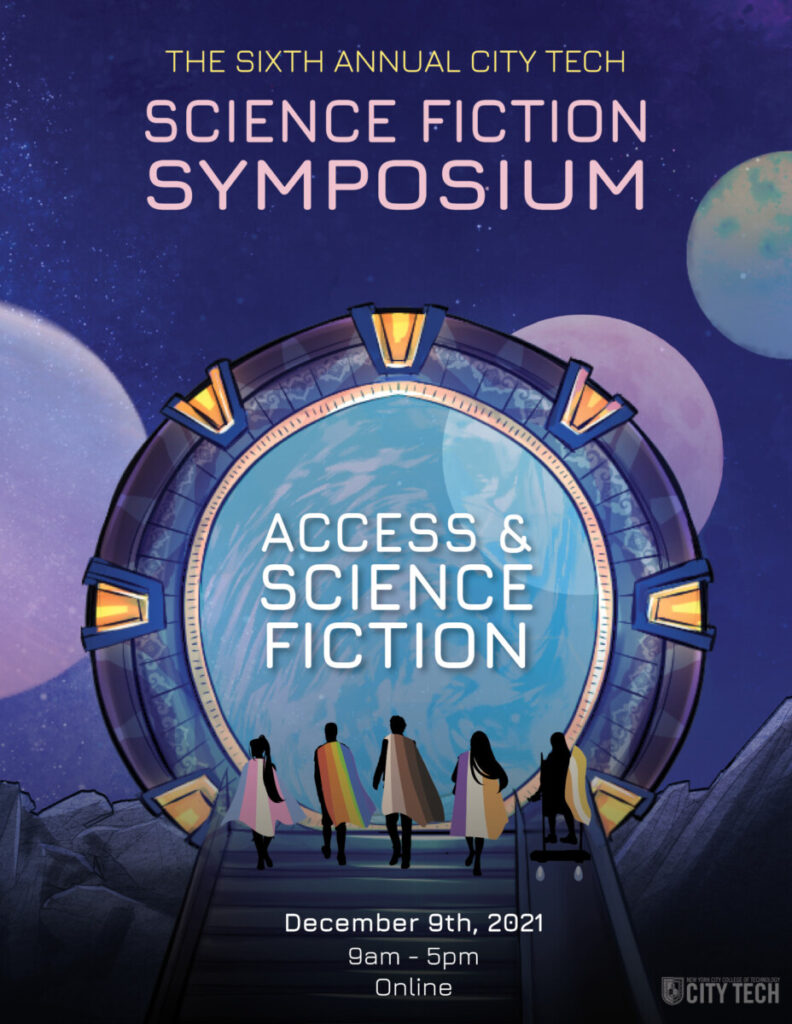
The Sixth Annual City Tech Science Fiction Symposium on the topic of Access and SF was held on Thursday, Dec. 9, 2021 as a Zoom Webinar. You can read the full program here.
Included below are videos of each session as well as links to expanded presentations .
Many thanks again to everyone who participated and contributed to this year’s event!
Opening
Jason W. Ellis
Justin Vazquez-Poritz
Paper Session 1: Access to International SF
Jill Belli – Moderator
Emrah Atasoy – “Access to SF in Turkey and Turkish SF Abroad”
Shanky Chandra – “Chinese Science Fiction: A Literary Genre, A Tool of Teaching Science or A Secret Weapon of China’s Soft Power?”
Gillian Polack – “The Problem of Susan Australia, or, The Tyranny of Distance” | Watch Expanded Presentation
Paper Session 2: Access to Science/Fiction/World
A. Lavelle Porter – Moderator
Chris Leslie – “Reevaluating the Inclusiveness of the Interstellar Republic of Letters”
Katherine Buse and Anastasia Klimchynskaya – “Science Fiction and Citizen Science”
Aaron Zwintscher – “Star Wars Biomes: Simulacra, Nature, and Passivity in No Dialogue Nature Shows”
Discussion Panel: “Accessing the Feminist Science Fiction Archive, Or, Young Women Read Old Feminist SF”
Lisa Yaszek – Moderator
Panelists:
Josie Benner
Olivia Kiklica
Jessica Taetle
Edeliz Zuleta
Paper Session 3: Access, Inclusion, and Representation in SF
Joy Sanchez-Taylor – Moderator
Leigh Gold – “Confronting Language in the Science Fiction Text: Language, Access, and Trauma in Octavia Butler and Ursula K Le Guin”
Katherine Pradt – “Shipping Supergirl: Discovering and Defending Lesbian Identity Through a DC Fandom”
Sean Scanlan – “Cool Access and Access to Cool: Gibson’s Gun Moll, Dorotea Benedetti”
Ida Yoshinaga – “Corporate Employment Practices Towards Greater Diversity of Story Development for SFF Screen Stories”
Paper Session 4: Access, Accessibility, Bodies, and Minds in SF
Lucas Kwong – Moderator
Jacob Adler – “‘Everything Herein is Fantastic’: Accessibility and Inclusivity in Dungeons & Dragons”
Ryan Collis – “Autistic Speculative Imaginings: Accessing and Creating Minor Literatures”
Annette Koh – “Urban Planning for Cyborg Cities: Thinking about disabilities and mobilities in sci-fi as an urban planner”
Analog Writers Panel and the Analog Emerging Black Voices Award
Emily Hockaday – Moderator
Panelists
Alec Nevala-Lee
Marie Vibbert
Chelsea Obodoechina
Trevor Quachri and Emily Hockaday – Award Presentation
Keynote: “Writing Ourselves In: Teaching Writing and Science Fiction with Wikipedia”
Ximena Gallardo C. and Ann Matsuuchi
Wanett Clyde – Introduction and Moderator
Leading up to this special keynote event, everyone is invited to join the Opening Access to SF: City Tech Science Fiction Edit-a-thon 2021 Dec. 6-Dec. 10.
Ximena and Ann’s book chapter, “My Books Will Be Read By Millions of People!”: The LaGuardia Community College Octavia E. Butler Wikipedia Project,” that appears in Approaches to Teaching the Works of Octavia Butler, edited by Tarshia Stanley (Modern Language Association, 2019), has been made accessible via the CUNY institutional repository, Academic Works: https://academicworks.cuny.edu/lg_pubs/141/. This book was awarded Idaho State University’s 2021 Teaching Literature Award.
Program and Registration for Access and Science Fiction: The Sixth Annual City Tech Science Fiction Symposium

Registration and Viewing
The Sixth Annual City Tech Science Fiction Symposium on Access and Science Fiction will be held on Thursday, December 9, 2021 from 9:00am-5:00pm EST (GMT/UTC -5 hours) online via Zoom Webinar.
To participate in this free event, attendees will need to (1) Signup for a free Zoom account here (if you don’t already have one), and (2) Register here to receive access instructions to the Zoom Webinar. Participants may register any time before or during the event!
For those who would like to watch the event without registering, you can join the YouTube Livestream here (click on the top-most video labeled “Live”).
In addition to the Zoom Webinar Chat and YouTube Live Chat, join the event conversation with the event hashtag #CityTechSF and follow us on Twitter @CityTechSF.
As indicated below in the program, some symposium content is pre-recorded to offer more time for discussion on the day of the event. Pre-recorded content includes author readings and full paper presentations. Some of this content is in production and will be posted soon.
Leading up to this year’s special keynote event on “Writing Ourselves In: Teaching Writing and Science Fiction with Wikipedia” by Ximena Gallardo C. and Ann Matsuuchi, everyone is invited to join the Opening Access to SF: City Tech Science Fiction Edit-a-thon 2021 Dec. 6-Dec. 10. More information is available in this flyer.
Program
9:00am-9:15am
Opening
Jason W. Ellis
Justin Vazquez-Poritz
9:15am-10:05am
Paper Session 1: Access to International SF
Jill Belli – Moderator
Emrah Atasoy – “Access to SF in Turkey and Turkish SF Abroad”
Shanky Chandra – “Chinese Science Fiction: A Literary Genre, A Tool of Teaching Science or A Secret Weapon of China’s Soft Power?”
Gillian Polack – “The Problem of Susan Australia, or, The Tyranny of Distance” | Watch Expanded Presentation
10:05am-10:10am
Break
10:10am-11:00am
Paper Session 2: Access to Science/Fiction/World
A. Lavelle Porter – Moderator
Chris Leslie – “Reevaluating the Inclusiveness of the Interstellar Republic of Letters”
Katherine Buse and Anastasia Klimchynskaya – “Science Fiction and Citizen Science”
Aaron Zwintscher – “Star Wars Biomes: Simulacra, Nature, and Passivity in No Dialogue Nature Shows”
11:00am-11:05am
Break
11:05am-11:45am
Discussion Panel: “Accessing the Feminist Science Fiction Archive, Or, Young Women Read Old Feminist SF”
Lisa Yaszek – Moderator
Panelists:
Josie Benner
Olivia Kiklica
Jessica Taetle
Edeliz Zuleta
11:45am-11:50am
Break
11:50am-1:10pm
Paper Session 3: Access, Inclusion, and Representation in SF
Joy Sanchez-Taylor – Moderator
Leigh Gold – “Confronting Language in the Science Fiction Text: Language, Access, and Trauma in Octavia Butler and Ursula K Le Guin”
Katherine Pradt – “Shipping Supergirl: Discovering and Defending Lesbian Identity Through a DC Fandom”
Sean Scanlan – “Cool Access and Access to Cool: Gibson’s Gun Moll, Dorotea Benedetti”
Ida Yoshinaga – “Corporate Employment Practices Towards Greater Diversity of Story Development for SFF Screen Stories”
1:10pm-1:15pm
Break
1:15pm-2:25pm
Access, Accessibility, Bodies, and Minds in SF
Lucas Kwong – Moderator
Jacob Adler – “‘Everything Herein is Fantastic’: Accessibility and Inclusivity in Dungeons & Dragons”
Ryan Collis – “Autistic Speculative Imaginings: Accessing and Creating Minor Literatures”
Annette Koh – “Urban Planning for Cyborg Cities: Thinking about disabilities and mobilities in sci-fi as an urban planner”
2:25pm-2:30pm
Break
2:30pm-3:55pm
Analog Writers Panel and the Analog Emerging Black Voices Award
Emily Hockaday – Moderator
Panelists
Alec Nevala-Lee
Marie Vibbert
Chelsea Obodoechina
Trevor Quachri and Emily Hockaday – Award Presentation
3:55pm-4:00pm
Break
4:00pm-5:00pm
Keynote
“Writing Ourselves In: Teaching Writing and Science Fiction with Wikipedia”
Ximena Gallardo C. and Ann Matsuuchi
Wanett Clyde – Introduction and Moderator
Leading up to this special keynote event, everyone is invited to join the Opening Access to SF: City Tech Science Fiction Edit-a-thon 2021 Dec. 6-Dec. 10.
Ximena and Ann’s book chapter, “My Books Will Be Read By Millions of People!”: The LaGuardia Community College Octavia E. Butler Wikipedia Project,” that appears in Approaches to Teaching the Works of Octavia Butler, edited by Tarshia Stanley (Modern Language Association, 2019), has been made accessible via the CUNY institutional repository, Academic Works: https://academicworks.cuny.edu/lg_pubs/141/. This book was awarded Idaho State University’s 2021 Teaching Literature Award.
Participants
Jacob Adler has worked as the Metadata and Cataloging Librarian at the Bronx Community College Library since 2017. Before that he performed various other cataloging work, most notably at The Paley Center for Media from 2010 to 2016. In addition to his professional work he wrote a fantasy novel for the 2018 National Novel Writing Month contest; he continues to work on the novel and seek to get it published. He is especially interested in early television history, particularly the original 1959-1964 Twilight Zone television series. He is also currently pursuing a master’s degree in Museum Studies, which he is on track to receive in January 2022.
Emrah Atasoy, PhD, serves as a visiting postdoctoral scholar at University of Oxford’s Faculty of English between September 2021 and September 2022 as a recipient of the TUBITAK (The Scientific and Technological Research Council of Turkey) 2219 International Postdoctoral Research Fellowship Grant. His research interests include speculative fiction, futuristic narratives, critical future studies, utopian and dystopian studies, critical dystopia, science fiction, apocalyptic fiction, ecocriticism, posthumanism, Turkish speculative fiction, twentieth-century literature, and comparative literature. He was a visiting scholar at Penn State University under the supervision of Prof. Dr. Jennifer Wagner-Lawlor in the academic year 2015-16. His work has appeared in journals such as Studies in the Novel (2022, collaborative article with Prof. Dr. Thomas Horan), Utopian Studies, Librosdelacorte.es, Literary Voice, and Methis. Studia Humaniora Estonica. His monograph Epistemological Warfare and Hope in Critical Dystopia has been published by Nobel in 2021. His most recent publications include “Speculative Fiction Studies in Turkey: A Preliminary Survey” (2021), in Utopian Studies, “Dys/utopian Narratives on the Screen: Beyond the Binaries in Children of Men and Lobster” (2021), in The Postworld In-Between Utopia and Dystopia: Intersectional, Feminist, and Non-Binary Approaches in 21st Century Speculative Literature and Culture (2021, Routledge), edited by Tomasz Fisiak and Katarzyna Ostalska, and “Epistemological Warfare(s) in Dystopian Narrative: Zülfü Livaneli’s Son Ada and Anthony Burgess’s The Wanting Seed” in Speculations of War: Essays on Conflict in Science Fiction, Fantasy and Utopian Literature (2021, McFarland), edited by Annette M. Magid. He is a member of both Utopian Studies Society-Europe and the Society for Utopian Studies (SUS). His research at the University of Oxford is supported by TUBITAK BIDEB (The Scientific and Technological Research Council of Turkey) under Grant 2219-International Postdoctoral Research Fellowship Program.
Jill Belli is Associate Professor of English at New York City College of Technology, CUNY, where she happily teaches science fiction and utopian studies often. She’s working on long-standing projects on well-being & happiness in education and writing & revising in dystopian texts. Newer interests include looping as composing practice, tarot and astrology as storytelling and knowing, William Reynolds, and grief. Learn more about Jill and her interdisciplinary research and teaching: jillbelli.org.
Josie Benner is a Biomechanical Engineering Major and Science Fiction Minor at Georgia Tech. She works in Professor Lisa Yaszek’s Sci Fi Lab, with funding from Georgia Tech’s Center for Women, Science, and Technology and the Ivan Allen College for the Liberal Arts.
Katherine Buse uses methods from science and technology studies, science fiction studies, and the environmental humanities to study how science shapes and is shaped by its cultural milieu. She is working on a book project, titled Speculative Planetology: Science, Culture, and the Building of Model Worlds. It describes planetary world building, or speculative planetology, as a set of shared practices built up between planetary and climate scientists, creators of speculative fiction, engineers, and policymakers since the middle of the 20th century. She also studies and designs video games, including being on the design team for Foldit: First Contact, a new narrative version of the citizen science video game Foldit. She received her Ph.D in English with an emphasis in Science and Technology Studies at the University of California, Davis in 2021. As a Marshall Scholar, she received an MA in Science Fiction Studies at the University of Liverpool and an MPhill in Criticism and Culture at Cambridge.
Shanky Chandra is a Ph.D. scholar from the Centre for Chinese and Southeast Asian Studies, Jawaharlal Nehru University, India, in New Delhi. His research interests include modern and contemporary Chinese Science Fiction. The title of his Ph.D. thesis is “Socio-Political and Cultural Factors in the Making of Chinese Science Fiction Writer Liu Cixin: Understanding The Three-Body Problem.” Chandra took his B.A. (2011) and M.A. (2013) in Chinese language and literature, and M.Phil. (2016) from Jawaharlal Nehru University at New Delhi, India. In 2013, the Ministry of Human Resource Development (MHRD) awarded the Chinese Government Scholarship to Shanky Chandra for Post Graduate Diploma at Beijing Language & Culture University (Higher level 1 & 2) 2013-2014. Chandra taught Chinese language and literature at St. Stephen’s College (2014-2019), Delhi University. He completed the Advance Mandarin Teacher Training Program from the National Taipei University of Education Chinese Language Education Center, Taipei, Taiwan, in July 2018. Recently, he spent one year at the Department of Modern and Contemporary Chinese Language and Literature at the School of Chinese Language and Literature of Beijing Normal University (BNU) as a senior visiting scholar under the supervision of Prof. Wu Yan (HYI fellowship). He is also a member of the International Forum of Chinese Language Teachers (国际汉语教师微信群) and its official Account e-journal (国际汉语教师500强公众号). Currently, he is a visiting fellow at Harvard Yenching Institute, Harvard University.
Ryan Collis is a second year PhD student in Education at York University in Ontario, Canada who researches the creation of learning spaces for autistic students. He holds degrees in English (BA, Queen’s ‘99), Computer Science (BScH, Queen’s ‘00), Education (BEd, OISE ‘05), and Science and Technology Studies (BScH, York ’19; MA, York ‘20). Ryan has been a high school teacher in the York Region District School Board since 2006 and is a founding member of the editorial board of the Canadian Journal of Autism Equity. Ryan lives with his wife and son in Ajax, Ontario.
Jason W. Ellis is an Associate Professor of English at the New York City College of Technology, CUNY, where he coordinates the City Tech Science Fiction Collection. He coedited The Postnational Fantasy: Postcolonialism, Cosmopolitics and Science Fiction (McFarland, 2011) and a special issue on Star Wars: The Force Awakens of New American Notes Online, and talked with Dr. Neil deGrasse Tyson about the relationship between SF and society on StarTalk Radio. He holds a Ph.D. in English from Kent State University, M.A. in Science Fiction Studies from the University of Liverpool, and B.S. in Science, Technology, and Culture from Georgia Tech.
Ximena Gallardo C. is a professor of English at LaGuardia Community College-CUNY. She has been a Wikipedia editor since 2012 and a WikiEducation instructor since 2014. Among her current Wikimedia projects are The LaGuardia WikiProject Octavia E. Butler and the LaGuardia and Wagner Archives GLAM initiative, as well as the Wikibooks projects Perspectives in Digital Literacy and Themes in Literature.
Leigh Dara Gold received her doctorate in German Literature in 2011 from New York University. She teaches Introduction to Poetry and English 1121 at New York City College of Technology, and Ancient Literature and Composition at Borough of Manhattan Community College. Her current research interests include science fiction’s role in the classroom, research on Ursula K. Le Guin, and connections between dance, literature, and philosophy.
Emily Hockaday is the managing editor and poetry editor for Asimov’s Science Fiction and Analog Science Fiction and Fact. Her first full-length poetry collection, Naming the Ghost, will be out in November 2022 with Cornerstone Press. You can find her online at www.emilyhockaday.com or @E_Hockaday.
Olivia Kiklica is a Computational Media Major and Science Fiction Fellow at Georgia Tech. She works in Professor Lisa Yaszek’s Sci Fi Lab, with funding from Georgia Tech’s Center for Women, Science, and Technology and the Ivan Allen College for the Liberal Arts.
Anastasia Klimchynskaya’s research brings together literary theory, sociology, and neuroscience to study how storytelling and narrative shape what (we believe) we know about the world. She received her PhD in Comparative Literature from the University of Pennsylvania, focusing on the way science fiction emerged as a literary form in the nineteenth century to express a new social and technoscientific paradigm. Her book project extends this work into the twenty-first century, using the two periods as foils for each other to examine how our fictions shape the innovation, use, and understanding of technoscientific advancements – and, in turn, how these advancements shape the very form of the stories we tell.
Annette Koh is a lecturer in the department of urban and regional planning at California State Polytechnic University, Pomona. Her work and teaching focus on the politics of participation, youth engagement, and placemaking. An obsession with narrative and speculative approaches to city planning has manifested in an essay The Right to the City: Urbanism, Planning and Cities in Science Fiction and Fantasy, the chapter “Unofficial Archives of Urban Life How to Rewrite the Canon of Cities” for a tumblr book and a world-building workshop in October 2021 for an urban planning studio at Hunter College. She wrote two essays for ProgressiveCity.net – Placemaking When Black Lives Matter; Decolonial Planning in North America – which were then published in the book Transformative Planning: Radical Alternatives to Neoliberal Urbanism. In 2017 and 2018, she collaborated with fellow PhD students and faculty to co-organize the Decolonizing Cities symposia at the University of Hawai‘i at Manoa.
Lucas Kwong is an assistant professor of English at New York City College of Technology. His scholarship on fantastic fiction, religion, and colonialism has been published in Victorian Literature and Culture, Religion and Literature, and Journal of Narrative Theory. He also serves as the assistant editor for New American Notes Online, an online interdisciplinary scholarly journal, and as editor for City Tech Writer, a journal of student writing. He lives in Brooklyn with his wife.
Chris Leslie (he/him) is a visiting professor at the South China University of Technology whose research investigates the interactions among science, technology, and society. This paper is based on the research for his book From Hyperspace to Hypertext: Masculinity, Globalization, and Their Discontents, which will be published by Palgrave in 2022. Dr. Leslie is chair of the IFIP working group on the history of computing and a creative consultant for Zhejiang Hexin Toy Group in Yunhe, China.
Ann Matsuuchi is an instructional technology librarian and professor at LaGuardia Community College-CUNY. Past writing projects include those that focus on Samuel R. Delany and Wonder Woman, sf tv shows such as Doctor Who, and Asian American comic books. Ann teaches digital literacy, online cultures, and the fundamentals of internet studies. Current projects include one that focuses on Melvin Van Peebles, and a reference guide to Delany’s works.
Alec Nevala-Lee was a 2019 Hugo and Locus Award finalist for Astounding: John W. Campbell, Isaac Asimov, Robert A. Heinlein, L. Ron Hubbard, and the Golden Age of Science Fiction (Dey Street Books / HarperCollins), which was named one of the best nonfiction books of the year by The Economist. He is the author of three suspense novels from Penguin, including The Icon Thief, and his work has appeared in such publications as the New York Times, the Los Angeles Times, Salon, The Daily Beast, Analog Science Fiction and Fact, and two editions of The Year’s Best Science Fiction. His next book, Inventor of the Future: The Visionary Life of Buckminster Fuller, will be published by HarperCollins on August 2, 2022.
Evelyn Ng is a City Tech Communication Design student with a focus on illustration. She’s designed and illustrated the poster for “The Sixth Annual City Tech Science Fiction Symposium on Access and Science Fiction”. When she isn’t working, she spends her time looking through art publications to elevate her design techniques. See more of her work on Instagram and on her online portfolio.
Chelsea Obodoechina is a graduate student and teaching assistant. In her spare time, she writes short speculative fiction inspired by her academic background in sociology. Her works have been featured in Cast of Wonders, the Unfettered Hexes anthology, and Anathema: Spec from the Margins. She lives in Montreal, Canada with her family.
Gillian Polack, Ph.D. is an Australian speculative fiction writer based in Canberra, Australia. She was the 2020 recipient of the Ditmar (best novel, for her 2019 novel The Year of the Fruit Cake) and the Bertram A. Chandler (lifetime achievement in science fiction) awards. She is an ethnohistorian with a special interest in how story transmits culture, both Medieval and modern. Her current research examines how contemporary speculative fiction novels serve as vectors for cultural transmission. A study of this will be released in 2022 (Story Matrices: Cultural Encoding and Cultural Baggage in the Worlds of Science Fiction and Fantasy, Academic Lunare). Her research at Deakin University furthers this work. Dr Polack’s publications include ten novels, short stories, a monograph (History and Fiction, shortlisted for the William Atheling Jr Award for Criticism or Review) and various works of non-fiction. A list of her books can be found at https://gillianpolack.com/my-books/.
A. Lavelle Porter is an Assistant Professor of English at New York City College of
Technology. He holds a B.A. in history from Morehouse College and a Ph.D. in
English from the CUNY Graduate Center. His writing has appeared in venues such as
The GC Advocate, Callaloo, The New Inquiry, Poetry Foundation, and the African
American Intellectual History Society. He recently published The Blackademic Life: Academic Fiction, Higher Education, and the Black Intellectual with Northwestern University Press.
Katherine Pradt is a librarian at the Graduate Center of the City University of New York. In addition to supporting academic research and answering citation style questions (and troubleshooting the printers), she works to connect scholars to open-source tools and open access resources. She holds an MFA in addition to her library degree and is writing a novel set in occupied New York during the Revolutionary War.
Trevor Quachri, who took the reins of Analog Science Fiction and Fact as editor in 2012, started off as an editorial assistant in 1999 and worked his way up the ladder at Analog and Asimov’s Science Fiction, under Stanley Schmidt, Sheila Williams, and Gardner Dozois, respectively. On top of that, he’s also been a Broadway stagehand, collected data for museums, and executive produced a science fiction pilot for a basic cable channel. He lives in New Jersey with his fiancée, daughter, and way, way too many comic books.
Joy Sanchez-Taylor is a Professor of English at LaGuardia Community College (CUNY) whose research specialty is intersections between science fiction, fantasy, and critical race theory. Her book Diverse Futures: Science Fiction and Authors of Color (2021) examines the contributions of late twentieth and twenty-first century U.S. and Canadian science fiction authors of color to the genre. Dr. Sanchez-Taylor is currently working on a monograph project on diverse fantasy representations.
Sean Scanlan is Associate Professor of English at New York City College of Technology—CUNY where he specializes in literary technologies and American and global literature. He published “Global Homesickness in William Gibson’s Blue Ant Trilogy,” for the collection The City after 9/11: Literature, Film, Television (2016), and he is the founder and editor of NANO: New American Notes Online.
Jessica Taetle is a Computational Media Major and Science Fiction Fellow at Georgia Tech. She works in Professor Lisa Yaszek’s Sci Fi Lab, with funding from Georgia Tech’s Center for Women, Science, and Technology and the Ivan Allen College for the Liberal Arts.
Justin Vazquez-Poritz is the Dean of the School of Arts and Sciences at New York College of Technology, CUNY.
Marie Vibbert has sold over 70 short stories to professional publications such as Analog Science Fiction & Fact, The Magazine of Fantasy & Science Fiction, Nature, Vice’s Motherboard, Lightspeed, Escape Pod, and more. Her works have been translated into Chinese and Vietnamese. Her debut novel, Galactic Hellcats, came out in 2021. Publisher’s Weekly called it “A rip-roaring space heist.” By day she is a computer programmer at Case Western Reserve University.
Lisa Yaszek is Regents’ Professor in the School of Literature, Media, and Communication, where she explores science fiction as a global language crossing centuries, continents, and cultures. Yaszek’s books include Galactic Suburbia: Recovering Women’s Science Fiction (Ohio State, 2008); Sisters of Tomorrow: The First Women of Science Fiction (Wesleyan 2016); The Future is Female! 25 Classic Science Fiction Stories by Women (Library of America, 2018); and Literary Afrofuturism in the Twenty-First Century (co-edited with Isiah Lavender III, Ohio State, 2020). Her ideas have been featured in The Washington Post, Food and Wine Magazine, and USA Today, and she has been an expert commentator for the BBC4’s Stranger Than Sci Fi, Wired.com’s Geek’s Guide to the Galaxy, and the AMC miniseries James Cameron’s Story of Science Fiction. A past president of the Science Fiction Research Association, Yaszek currently serves as a juror for the John W. Campbell and Eugie Foster Science Fiction Awards.
Ida Yoshinaga is an Assistant Professor of Science Fiction Film at the Georgia Institute of Technology, and her screen-studies research centers on the production relations between creative labor from racial/gender/class minority groups and majority-dominated management, within corporate transmedia. Along with workplace allyship between these two unequal statuses, she studies the global stratification of SFF-genre scriptwriting within the story development process, as well as produces and facilitates the development of cultural screenplays for Indigenous or 4th cinema and TV.the development of cultural screenplays for Indigenous or 4th cinema and TV.
Edeliz Zuleta is a Biomechanical Engineering Major and Science Fiction Minor at Georgia Tech. She works in Professor Lisa Yaszek’s Sci Fi Lab, with funding from Georgia Tech’s Center for Women, Science, and Technology and the Ivan Allen College for the Liberal Arts.
Aaron Zwintscher is an adjunct professor of English at the New York City College of Technology. He is also an ambient musician and noise artist.

